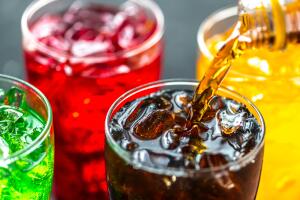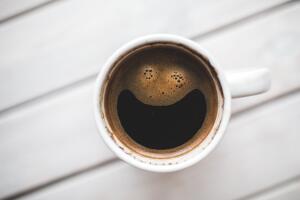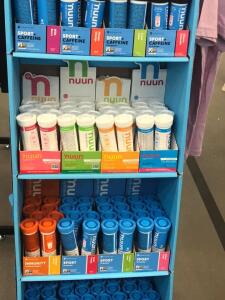
Nutrition in the News: Teens who Drink Soda Eat More Calories
Source: Pediatric Obesity
 Adolescents who drank regular and diet soda, and other diet beverages ate an extra 200 calories per day as compared to their peers who only drank water, according to a recent study published in Pediatric Obesity. This suggests a strong connection between drinking soda and gaining weight. In the past, low calorie and low-to-no sugar drinks were thought to help people cut calories for weight management, but in the end, lead to eating more calories in the form of added sugars in food and drinks. These findings have far reaching implications since being overweight or obese is associated with an increased risk of type 2 diabetes, heart problems, and other health problems. Parents and caregivers should take this information to heart by first leading by example and providing children with options other than soda. Adolescents and adults should aim to drink more water (instead of soft drinks). If water lacks appeal, try purchasing a water bottle with a built-in diffuser. Add-in slices of cucumbers, mint leaves, or fresh berries. Even a splash of fruit juice in water is a better option than soda.
Adolescents who drank regular and diet soda, and other diet beverages ate an extra 200 calories per day as compared to their peers who only drank water, according to a recent study published in Pediatric Obesity. This suggests a strong connection between drinking soda and gaining weight. In the past, low calorie and low-to-no sugar drinks were thought to help people cut calories for weight management, but in the end, lead to eating more calories in the form of added sugars in food and drinks. These findings have far reaching implications since being overweight or obese is associated with an increased risk of type 2 diabetes, heart problems, and other health problems. Parents and caregivers should take this information to heart by first leading by example and providing children with options other than soda. Adolescents and adults should aim to drink more water (instead of soft drinks). If water lacks appeal, try purchasing a water bottle with a built-in diffuser. Add-in slices of cucumbers, mint leaves, or fresh berries. Even a splash of fruit juice in water is a better option than soda.
Nutrition in the News: Coffee for Weight Loss?
Source: Scientific Reports
 In a recently published study in Scientific Reports (June 2019), researchers set out to explore if coffee drinking was associated with weight loss specifically by stimulating brown fat. Brown fat is the kind of fat that is used by hibernating animals for energy and stimulated by the cold. In humans, it is primarily found in blood vessels. Through thermal imaging, researchers discovered that drinking coffee heated up certain blood vessels known to hold brown fat deposits leading to increased energy expenditure. However, researchers were unsure if coffee itself stimulated brown fat or whether it was caffeine or some other property in coffee. With a large number of Americans fitting into the overweight category these days making it a public health problem, researchers concluded that coffee should be further studied since it is a popular drink. At this time, there’s not enough evidence to suggest that coffee drinking directly leads to weight loss, so be careful about increasing your coffee consumption.
In a recently published study in Scientific Reports (June 2019), researchers set out to explore if coffee drinking was associated with weight loss specifically by stimulating brown fat. Brown fat is the kind of fat that is used by hibernating animals for energy and stimulated by the cold. In humans, it is primarily found in blood vessels. Through thermal imaging, researchers discovered that drinking coffee heated up certain blood vessels known to hold brown fat deposits leading to increased energy expenditure. However, researchers were unsure if coffee itself stimulated brown fat or whether it was caffeine or some other property in coffee. With a large number of Americans fitting into the overweight category these days making it a public health problem, researchers concluded that coffee should be further studied since it is a popular drink. At this time, there’s not enough evidence to suggest that coffee drinking directly leads to weight loss, so be careful about increasing your coffee consumption.
This Month’s Question: When should I eat and drink during long training runs or races?
Feel free to submit your nutrition-related question to Katina. Send questions to: ksayerswalker@gmail.com
 For easy workouts that are less than 45 minutes, going without food won’t do any harm (but stay hydrated – see below for more). You should have plenty of glycogen stored for these shorter workouts – your best bet is to eat a reasonably sized meal about three hours before a workout or a small snack about 30 minutes before a workout (around 100-150 calories max). For workouts longer than 45 minutes, you should start eating about 40 minutes into a run and eat every 40 minutes thereafter. Not doing so may bring on fatigue sooner and you’ll have a tougher time hitting your performance goals. Choose sports nutrition products that are specially formulated with easy to digest carbohydrates and sugars, such as sports gels or chews – check out these products: GU, Honey Stinger Waffles, Picky Bars (pre-cut the bar into bit size pieces), or Clif Blok Energy Chews. During a workout, the body is not efficient at digesting protein, fats, or fiber, so go with an option that is high in carbohydrate to prevent GI distress. Some people may choose real food over sports nutrition products. Some good options here are squeeze packs of maple syrup or apple sauce. Use training runs to experiment with these options and timing of nutrients. Figure out where you’ll keep the food on your body, and the best way to get the food out so it doesn’t impact your pace or stride. Remember to take small bites or sips, and food should always be followed with a chaser of water. Pre-race learn about where food and water stations will be located on the race course, the kind of fueling options available, and if that product will work for your body. Again, experiment with the same product during training runs, so you know how your body will respond. On race day, don’t leave anything up to chance; this is not the day to wing it. If you’re concerned about getting the “trots,” avoid high fiber foods, foods containing lactose, high fat foods, and caffeine.
For easy workouts that are less than 45 minutes, going without food won’t do any harm (but stay hydrated – see below for more). You should have plenty of glycogen stored for these shorter workouts – your best bet is to eat a reasonably sized meal about three hours before a workout or a small snack about 30 minutes before a workout (around 100-150 calories max). For workouts longer than 45 minutes, you should start eating about 40 minutes into a run and eat every 40 minutes thereafter. Not doing so may bring on fatigue sooner and you’ll have a tougher time hitting your performance goals. Choose sports nutrition products that are specially formulated with easy to digest carbohydrates and sugars, such as sports gels or chews – check out these products: GU, Honey Stinger Waffles, Picky Bars (pre-cut the bar into bit size pieces), or Clif Blok Energy Chews. During a workout, the body is not efficient at digesting protein, fats, or fiber, so go with an option that is high in carbohydrate to prevent GI distress. Some people may choose real food over sports nutrition products. Some good options here are squeeze packs of maple syrup or apple sauce. Use training runs to experiment with these options and timing of nutrients. Figure out where you’ll keep the food on your body, and the best way to get the food out so it doesn’t impact your pace or stride. Remember to take small bites or sips, and food should always be followed with a chaser of water. Pre-race learn about where food and water stations will be located on the race course, the kind of fueling options available, and if that product will work for your body. Again, experiment with the same product during training runs, so you know how your body will respond. On race day, don’t leave anything up to chance; this is not the day to wing it. If you’re concerned about getting the “trots,” avoid high fiber foods, foods containing lactose, high fat foods, and caffeine.
Regardless if you’re training or racing, hydration should start within 20 minutes and you should be sipping on about 4 ounces of water every 20 minutes during your efforts in hot or cold weather. You might need more if you go into a workout partially dehydrated. Drinking too much water might cause nausea, so be cautious until your know your limits. Plain water is always a good choice, but in extreme heat and humid conditions, add electrolytes to your water to replace lost sodium and other minerals. I will personally carry a bottle of plain water and another with a weak solution of electrolyte mix to cover my bases. My “go to” products for electrolyte replacement are Nuun tabs and Hammer Endurolytes Fizz tabs. After your run, replace lost fluids by drinking 20-24 ounces of water for every pound of body weight lost during the workout. Use a hand-held or belt carrier for water bottles or check out a hydration vest for long endurance runs and hikes. If you haven’t urinated post-run or race within 30 minutes, you’re more than likely experiencing dehydration, so keep pushing in the fluids.
Fleet Feet Syracuse carries all of these products (the nutrition/hydration consumable products as well as gear that will help you carry nutrition/hydration with you on your runs!!), so ask one of their helpful Outfitters to guide you to the appropriate product!
Katina Sayers is the owner/operator of Katina’s Nutritional Coaching Corner. She has an extensive background in health and education that began with degrees in exercise physiology, health and physical education, community health, and culminating with a doctoral degree in curriculum and instruction. She completed an advanced certificate of study in Integrative Nutrition and Health Coaching from the renowned Institute for Integrative Nutrition (IIN) in New York City. For the last four years, she has worked one-on-one with clients, presented a multitude of nutrition topics for large and small audiences, contracted with businesses to implement worksite wellness initiatives, and currently manages day-to-day food service operations at a local non-profit agency, as well as directs activities related to nutrition and health. Katina can be reached at ksayerswalker@gmail.com.
Latest News
Upcoming Events
Tully Free Library Turkey Trot 5K Run/Walk
All Day | 5872 Meeting House Rd, Tully, NY 13159
The Tully Free Library Turkey Trot 5K Run/Walk is held every year on Thanksgiving Day mornin…
Learn More ›Live Like Liam
All Day | Jamesville-DeWitt High School, 6845 Edinger Dr, De Witt, NY 13214
"Live Like Liam"... Celebrate life and community as you help fund important initiatives in L…
Learn More ›
Connect With Us
see the latest from Fleet Feet Syracuse